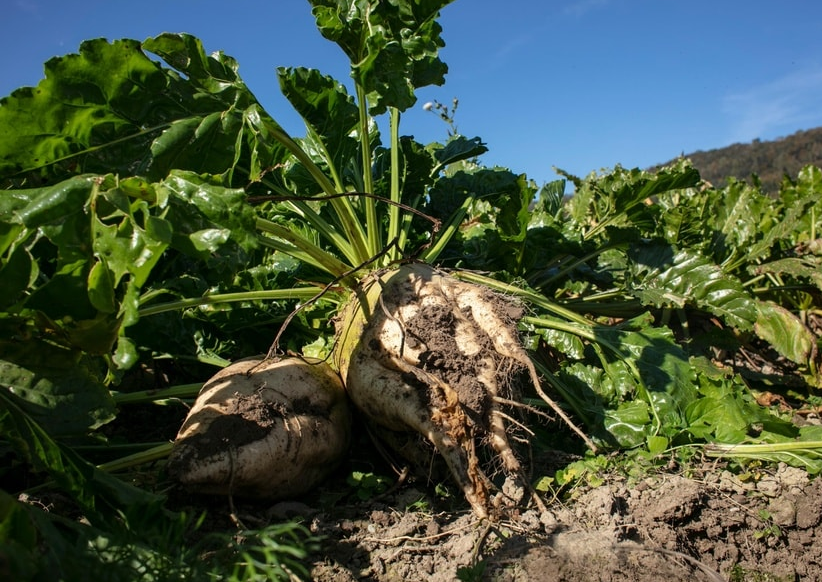
In less than a decade the surface area dedicated to growing sugar beets in Switzerland has dropped from 20,000 hectares to 16,500 hectares Thomas Kern/swissinfo.ch
Every year from October to December more than 1.5 million tonnes of sugar beets grown in Switzerland are harvested to supply the country’s sugar industry – an industry being kept alive by massive government subsidies. SWI swissinfo.ch reports from Aarberg, home to the country’s largest sugar factory.
The thick white plume of smoke rises through the morning fog of the Bernese Seeland as we approach the town of Aarberg, located in the heart of the region sometimes referred to as Switzerland’s vegetable garden. The scent of caramel and earth swirl through the air as the enormous storage vats belonging to the Sucre Suisse (Sugar Switzerland) factory appear through the mist.
Making its way through the factory gates is a stream of trucks, tractors and trains – all loaded to the brim with freshly harvested sugar beets. During peak production season from October to December, more than 10,000 tonnes of the white root vegetable arrive daily from across the country.
In a process practically unchanged since the factory opened in 1912, the beets are cleaned, pulped and transformed into sugar. An incessant noise accompanies the shift workers as they go about their business 24 hours a day, seven days a week. Every day during the high season the plant churns out nearly 1,000 tonnes of sugar.
Price in freefall
The Aarberg site is one of two – the other is in Frauenfeld, northeastern Switzerland – owned by Sucre Suisse. Together they account for all of Switzerland’s sugar production capacity, which tops out at around 270,000 tonnes annually. More than two-thirds of the sugar produced by Sucre Suisse is gobbled up by the country’s food industry, with clients including the makers of Red Bull and Rivella drinks, multinational food and drinks conglomerate Nestlé, and chocolate maker Lindt.
“Switzerland has a sugar self-sufficiency rate of nearly 80%,” says Raphael Wild, head of communications at Sucre Suisse. Most of the shortfall is imported from the European Union, with 3,300 tonnes of cane sugar imported from Mauritius.
But the local industry is fragile. The negotiated price of Swiss sugar is calculated in line with the global market, which is subject to price fluctuations. Bilateral agreements also link prices to those of the EU, which have fallen sharply since 2017, when Brussels freed up production volumes and removed export restrictions. This dragged down prices in Switzerland, hitting local farmers’ profit margins and driving many to abandon the market.
Growing subsidies
In less than a decade the surface area dedicated to growing sugar beets in Switzerland has declined from 20,000 hectares to 16,500 hectares. Today the crop accounts for just under 2% of the country’s usable agriculture space, and the number of people farming beets has dropped from 6,000 five years ago to 4,500 today.
In 2018, in a bid to halt the industry’s decline, the government increased subsidies for beets growers by CHF300/ha ($325/ha) to CHF2,100/ha. It also put a premium on organic production and introduced a customs protection of at least CHF70 per tonne of sugar. In September parliament extended the measures until 2023.
This year the industry breathed a small sigh of relief as global conditions improved.
“Prices are again rising. This is largely due to a historic drought which hit Brazil this year. Sugar cane crops suffered enormously, creating a global shortage,” Wild says.
The respite is expected to be temporary. Wild says it would be impossible for Swiss sugar to compete with foreign products without state support.
“It is obvious that without these government contributions to beets farmers, from which we benefit indirectly, we would be forced to close our business,” he says.
Taxpayers foot the bill
Switzerland’s sugar industry costs taxpayers around CHF70 million a year.
“It is the equivalent of nearly CHF4,000 in subsidies per hectare, which is more than most other crops,” says Vision Landwirtschaft, a thinktank made up of independent farming professionals that aims to encourage sustainable development and improve the economic position of Swiss agriculture.
Furthermore, the thinktank says beets are voracious consumers of pesticides, provoke soil erosion and create heavy soil compaction.
However, Wild says a study commissioned by Sucre Suisse found that Swiss sugar is 30% more sustainable than that produced in the EU.
Farmers call for return of banned pesticide
Sugar beet crops are often damaged by viral jaundice, a virus transmitted by aphids. In the past, to defeat the disease, farmers treated beet seeds before planting with Gaucho, a neonicotinoid-based insecticide. Gaucho was banned on January 1, 2019, owing to its toxicity to bees and aquatic organisms.
To limit viral jaundice, farmers say they must now spray infected beets more often with insecticides that are still authorised, accept higher percentages of crop losses, or stop growing beets altogether. So far, the Federal Office of Agriculture has rejected farmers’ demands that Gaucho be reauthorised for use.
In September, canton Fribourg lodged a parliamentary initiative calling for provisional reauthorisation of the controversial insecticide. Fribourg parliamentarians behind the initiative say reauthorising Gaucho would ensure the survival of the Swiss sugar industry.
The industry’s supporters argue that, because sugar is one of the basic foods stored by the government in the event of a crisis, maintaining sugar production in Switzerland is crucial. Strategic food reserves must be enough to cover three months of local consumption.
In a written reply to a motion put forward by Ursula Schneider Schüttel from the Social Democratic Party, the government justified its support for the industry: “Sugar is considered a basic commodity, [and] the creation of reserves is compulsory under the law on the country’s economic supply.”
But critics are sceptical. “If we were left to ourselves in a crisis, we could not eat sugar by the spoonful,” Patrick Dümmler from thinktank Avenir Suisse told Swiss public television, SRF. He argues that state support for Switzerland’s sugar industry is also bad from a health standpoint. “That’s why I think the importance of security of supply for the country is exaggerated.”
Global sugar production and consumption
In 2020, global production of sugar was 180 million tons, around 80% of which was produced from sugar cane. Brazil is the world’s largest producer of sugar, ahead of India and China. Germany, the United States and France are the three biggest producers of sugar made from sugar beets. The average global consumption of sugar is around 25kg per person per year. In Switzerland, each person consumes around 39kg of sugar a year, compared with just 3kg in 1850.
Tags: Business,Featured,newsletter
































